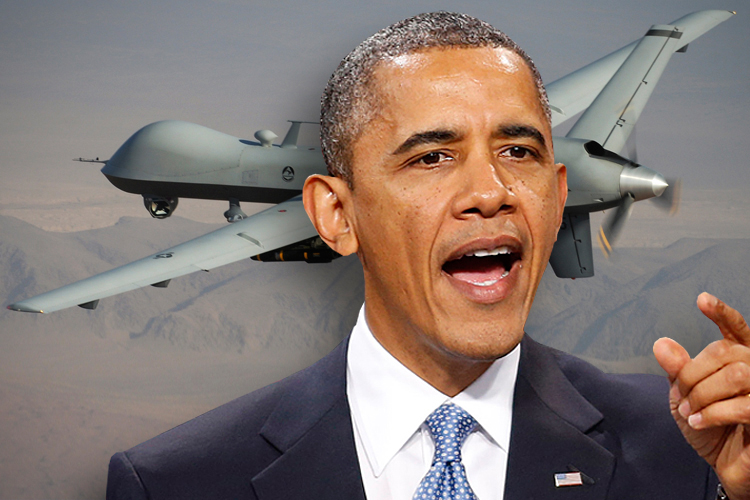Today, Barack Obama will give a speech about drones. And about other stuff, like closing Guantánamo, but primarily about drones. It will … probably not remotely satisfy either his left-wing (and libertarian) critics who see his drone policy as an inherently immoral enterprise or his right-wing critics who think the president is not sufficiently committed to defeating Islamic terrorism. But it will probably do less to satisfy his right-wing critics, because Obama has apparently wrested control of our unmanned missile-launching flying machines from the CIA.
In preparation for the speech yesterday, the Justice Department acknowledged, officially, that the U.S. has killed American citizens in drone strikes. As Spencer Ackerman says, we’ve droned four Americans, “3 by accident.” (This is actually not counting all U.S. citizens killed in drone srikes going back to the Bush administration.) Eric Holder mentioned the deaths in a letter to Sen. Pat Leahy obtained by the New York Times. The letter is primarily a lengthy justification of the assassination of Anwar Awlaki. Of the other three, including Awlaki’s teenage son, Holder simply says they were “not specifically targeted.” So, whoops? Sorry, Samir Khan, Abdulrahman Awlaki and Jude Kenan Mohammad.
We’ll see if the president actually addresses the various legal and moral arguments raised by the prospect of a no-risk airborne robot assassination weapon, or if he just responds to straw men who say things like, “Why don’t you want the United States to kill terrorists?” I’m guessing more of the latter.
Aiding the president in his mission to respond to straw men will likely be most of the Republican Party, including its most prominent (and practically only) voice for civil liberties, Sen. Rand Paul, whose famous filibuster on the subject of drones was based solely on a so-far implausible hypothetical: that the president would authorize a domestic drone strike of an American citizen. Paul’s opposition to drones seems entirely based on the prospect of them being used in the U.S., where they are not actually necessary. (Our various police forces are perfectly capable of killing on their own, without killer flying robot help, thank you very much.) The senator is writing legislation banning the use of drones for surveillance without a warrant, which is at least a more realistic concern. (The legislation would permit drone surveillance of the Mexican border, of course.)
Hopefully the end of the CIA’s drone program will mean the end of “signature strikes,” in which anonymous foreigners who merely look like they’re up to no good are murdered, with bombs, by our intelligence agency. The Times says Obama has signed a new “classified policy guidance” that “will sharply curtail the instances when unmanned aircraft can be used to attack in places that are not overt war zones.”
But the president also “plans to offer a robust defense of a continued role for targeted killings.” We already know the basic rationale for drone strikes: They necessitate less risk (of American lives) than conventional military action and they remove the apparently uncomfortable question of what to do with terrorists who can’t be charged with conventional crimes. For the Obama administration, drones provide a handy replacement for the Bush administration’s use of indefinite detention, which was highly problematic, as various inmates at our Cuban military prison could tell you.
By focusing almost solely on U.S. citizens killed, purposely or not, in drone strikes, the press and the president’s political opposition have essentially ignored the most compelling moral arguments against the codification of a drone assassination policy. There are reasons countries like the U.S. do not officially assassinate individuals (even if, yes, the CIA has done so in the past, often unsuccessfully). There’s blowback, there’s “collateral damage,” there’s the threat that our policy will make Americans targets of other countries using the exact same rationale, there’s the fact that our military’s definition of “imminent threat” is laughably broad, and there’s the fact that extrajudicial assassination of individuals proven guilty of no specific crime is a pretty direct contradiction to our democratic tradition, a tradition we are regularly (and correctly) calling superior to the alternatives offered by various Islamic extremists.
The policy change seems to be a good sign. The speech will probably be maddening. The president may not even mention the policy change, because the CIA’s drone program, like the killing of Awlaki, is still officially classified, even though everyone knows about it. Maybe the president’s next policy shift can involve the absurd and ridiculous over-classification of everything having to do with national security and the actions of our intelligence agencies. An unintentionally funny paragraph in the Washington Post’s story on the coming speech captures what I imagine will be the basic thrust:
The president is expected to talk generally about the need for greater transparency in the drone strikes and may allude to the desire to give greater responsibility for those operations to the military. But he is likely to tread carefully on an issue that involves classified CIA operations.
So, expect vague generalities about transparency, I guess, because most of the stuff that seems to demand transparency is classified.

